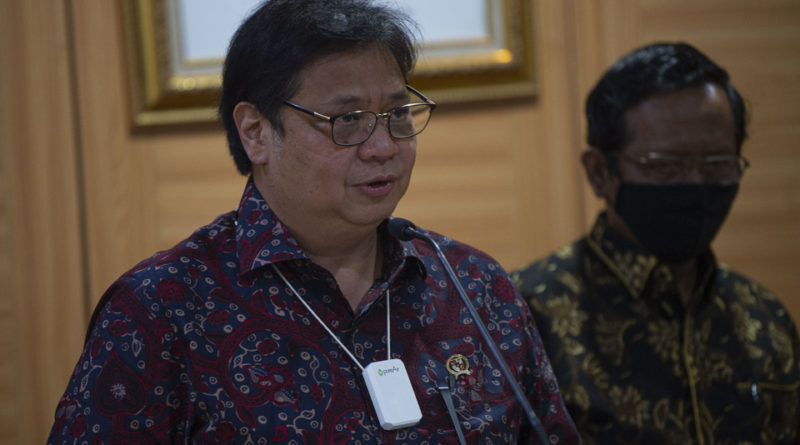COVID-19 PANDEMIC: The update-10.04.2020- JAKARTA- Workers to Get Unemployment Benefits as Gov’t, House Clear the Last Hurdle for Omnibus Bill
The Coordinating Minister for Economic Affairs Airlangga Hartarto. (Antara Photo/Aditya Pradana Putra)
.
.
Sick Earth Update- 10.04.2020
Plague Day 310:

.
Jakarta. The government and the House of Representatives have completed the discussion on the Jobs Creation Bill on Saturday, introducing clearing the last hurdle for a sweeping legislation reform that promises to improve Indonesia’s investment climate.
The bill, also known as the omnibus bill, is likely to be ratified in the House plenary’s meeting on Oct 8 to become a law, with only Susilo Bambang Yudhoyono’s Democrat Party and the Prosperous Justice Party, wich a combined total vote in the House voiced their opposition on the bill.
President Joko “Jokowi” Widodo has long championed the bill as a panacea for Indonesia’s sluggish economic growth. Once the bill passed into law, it would allow the central government to trim excessive rules and regional regulations that inhibit investment in the country.
.


SPACE RESERVE FOR ADVERTISEMENT
.
The bill would revise 76 laws, including the 2003 Law on Labor, 2009 Law on Tax General Procedures and Provisions, the 2008 Law on Income Tax, the 2009 Law on Value Added Tax, and Tax on Luxury Goods Sale Tax, and the 2017 Law on Indonesian Migrant Workers Protection.
The Coordinating Minister for Economic Affairs Airlangga Hartarto said on Sunday that the revisions in the bill were in line with the government’s aim to improve the investment ecosystem ant the ease of doing business; empower small businesses and cooperatives; create jobs; encourages research and innovation; simplify land acquisition process, establish special economic area; and accelerate government’s strategic projects.
“We believe that this substance coverage will be able to support all of our efforts to create jobs for all Indonesians through increased investment,” Airlangga said in a statement.
.


SPACE RESERVE FOR ADVERTISEMENT
.
Erwan Teguh and Peter Sutedja, analysts at CGS-CIMB Sekuritas Indonesia, wrote in their recent note to clients that the bill presented a test for “the president’s resoluteness in pushing for reforms that may structurally reshape the economy, as well as the solidity of the ruling coalition.”
“Passing of the bill with labor law reform shall lift business sentiment tremendously, which could go a long way in improving the investment outlook in 2021. The market clearly has yet to price in the impact of this new law,” the analysts wrote.
.


SPACE RESERVE FOR ADVERTISEMENT
.
Unemployment Insurance
Labor affairs have been the contentious issues in the discussion of the job creation bill, with labor representatives argued the bill would strip away protections and benefits currently received by Indonesian workers.
On the other hand, businesses often complain that Indonesia’s labor law was so strict that in case of bankruptcy, it is cheaper to leave their assets to rot than to meet the severance pay obligations to the workers.
Said Iqbal, chairman of the Confederation of Indonesian Workers’ Unions (KSPI), said on Sunday that workers were against the bill’s revision on employment termination rules, foreign workers, minimum wages, and how employers would not face criminal prosecutions over labor issues.
The workers were also displeased with the bill’s revisions on menstrual and maternity leaves, severance pay, contract workers, outsourcing, working hours, health insurance, and pensions benefits. Said said the worker’s unions plan to hold a two-day strike from next Tuesday.
Airlangga, however, said that the bill had addressed the worker’s concerns. For example, under the bill, the government would provide unemployment insurance for all workers as part of the country’s social security program for workers, BPJS Ketenagakerjaan.
The new benefit would not reduce the work accident benefit, life insurance, and pensions the workers enjoyed today, “nor increase [BPJS Ketenagakerjaan] premium costs that had to be paid by the workers or companies,” Airlangga said.
Airlangga said that the bill also did not make any changes to menstrual and maternity leaves, nor leave the contract workers unprotected.
The bill also revised the labor law to allow more flexible working hours. “We must do that in regards to recent trends of new jobs that emerge in Industry 4.0 and digital economy,” Airlangga said.
.


SPACE RESERVE FOR ADVERTISEMENT
.
For Businesses
Airlangga said the Job Creation Bill would streamline processes for business licenses, intellectual property rights, and registration of limited liability company (PT).
Public places like a bus terminal, airports, and train stations would have designated spaces for SMEs products, Airlangga said.
The bill would allow at least nine persons to establish cooperatives. The previous law requires at least 20 people as cooperatives’ founders.
The bill would limit criminal prosecutions to safety, security, health, and environmental violations for corporations. Other violations would only result in administrative sanctions or fines.
The House and the government agreed to include the one map policy in the law. The policy should eliminate overlaps in various maps produced by various ministries, institutions, and local governments that often lead to prolonged land disputes.
“For the government itself, the Job Creation Bill is an impetus for implementing bureaucratic services that are faster with less uncertainty using electronic systems,” Airlangga said.
“The Job Creation Bill also emphasizes the role and function of the local government as part of the central government, where the local government still exercises the existing authority under the norms, standards, procedures, and criteria set by the central government,” he said.
BY :DION BISARA, ASNI OVIER, FAROUK ARNAZ
.


SIGN UP TO RECEIVE OUR EMAIL
.
The most important news of the day about the ASEAN Countries and the world in one email: [email protected]
10.04.2020









